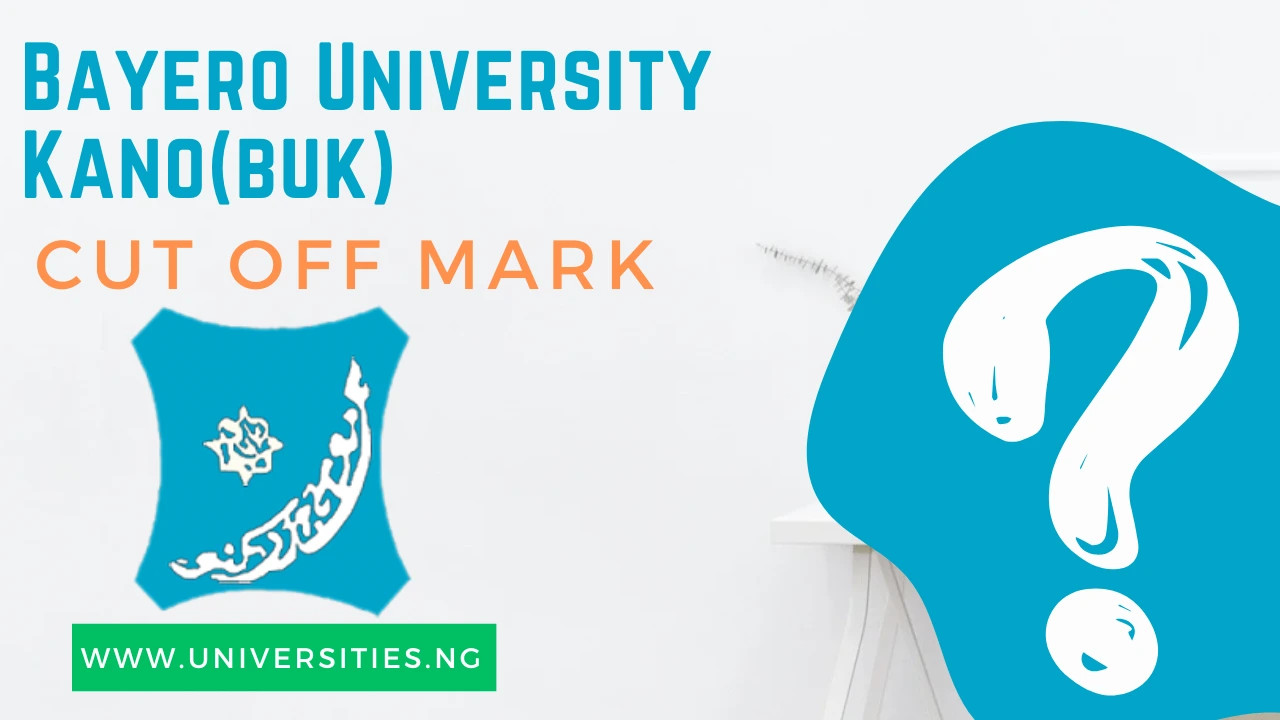Bayero University Kano, popularly known as BUK, is one of Nigeria’s leading higher education institutions. Founded in 1975, BUK has grown from a college to a full-fledged university committed to academic excellence and innovation.
Situated in Kano State, this university is strategically located in an exciting city that epitomizes the intermarriage of traditional cultural heritage and modernity. BUK is home to world-class facilities and a culturally diversified academic community, fostering intellectual growth and research.
What is BUK’s Cut-Off Mark?
A cut off mark is the lowest score an academic institution allows for the admission of students to a particular department or study program. It normally considers the general performance of candidates in the standard test.

The approved cut off mark for Bayero University Kano (BUK) for all courses in the 2024/2025 admission session is 180 and above.
Scoring at least 180 in the UTME makes a candidate eligible to sit for the post-UTME examination for any course of their choice. However, some courses, like Medicine, Law, and Engineering, require cut-off marks above 180. Higher competitive courses usually have departmental cut-off marks above 200, depending on the number of applicants.
BUK Cut-Off Mark for All Courses
While the general benchmark for eligibility is 180, the cut-off mark for Bayero University Kano varies by course. Competitive programs often have higher thresholds.
Courses | Typical Cut-Off Mark |
Faculty of Agriculture | |
Agricultural Economics and Extension | 180 |
Animal Science | 180 |
Crop Protection | 180 |
Agronomy | 180 |
Soil Science | 180 |
Fisheries and Aquaculture | 180 |
Faculty of Allied Health Sciences | |
Medical Laboratory Science | 200 |
Nursing Sciences | 200 |
Physiotherapy | 200 |
Radiography | 200 |
Optometry* | 200 |
Faculty of Arts and Islamic Studies | |
Arabic | 180 |
English | 180 |
French (under Foreign Languages) | 180 |
Hausa | 180 |
History | 180 |
Islamic Studies | 180 |
Linguistics | 180 |
Library and Information Science | 180 |
Faculty of Basic Medical Sciences | |
Anatomy | 200 |
Biochemistry | 200 |
Physiology | 200 |
Pharmacology | 200 |
Faculty of Clinical Sciences | |
Medicine and Surgery (MBBS) | 200 or above |
Faculty of Communication | |
Mass Communication | 180 |
Information and Media Studies | 180 |
Faculty of Computer Science & IT | |
Computer Science | 180 |
Software Engineering | 180 |
Information Technology | 180 |
Cyber Security | 180 |
Data Science | 180 |
Faculty of Earth & Environmental Sciences | |
Architecture | 180 |
Building | 180 |
Environmental Management | 180 |
Estate Management | 180 |
Geography | 180 |
Geology | 180 |
Urban and Regional Planning | 180 |
Faculty of Education | |
Adult Education | 180 |
Education (various subject combos) | 180 |
Educational Psychology | 180 |
Guidance and Counselling | 180 |
Library and Information Science (Education) | 180 |
Physical and Health Education | 180 |
Special Education | 180 |
Teacher Education | 180 |
Technology Education | 180 |
Faculty of Engineering | |
200 | |
Electrical Engineering | 200 |
Mechanical Engineering | 200 |
Agricultural Engineering | 200 |
Chemical Engineering | 200 |
Computer Engineering | 200 |
Mechatronics Engineering | 200 |
Petroleum and Gas Engineering | 200 |
Faculty of Law | |
LL.B. (Bachelor of Laws) | 200 or above |
Faculty of Management Sciences | |
Accounting | 180 |
Banking and Finance | 180 |
Business Administration | 180 |
Public Administration | 180 |
Marketing | 180 |
Entrepreneurship | 180 |
Faculty of Pharmaceutical Sciences | |
Pharmacy (B.Pharm. or Pharm.D.) | 200 or above |
Faculty of Science | |
Biological Sciences (Botany, Zoology, etc.) | 180 |
Chemistry | 180 |
Mathematics | 180 |
Microbiology | 180 |
Physics | 180 |
Plant Biology | 180 |
Zoology | 180 |
Faculty of Social Sciences | |
Economics | 180 |
Political Science | 180 |
Sociology | 180 |
Geography | 180 |
Faculty of Veterinary Medicine | |
Veterinary Medicine | 200 or above |
BUK 2024/2025 Screening Exercise
The screening exercise is an essential part of the admission process, further assessing the academic qualifications of candidates and their readiness for college. Below is what participants should expect:
- Eligibility:
- Applicants must meet the departmental cut-off mark as a minimum requirement.
- Complete registration for the post-UTME screening exercise.
- Preference is typically given to those who selected BUK as their first choice.
- Screening Procedure:
- Post-UTME Test: Candidates take a computer-based test (CBT) focusing on subjects relevant to their chosen field of study.
- Document Verification: Submitted academic credentials, identification documents, and application details are reviewed for accuracy.
- Screening Timetable:
- The university will announce the dates and venues for the screening exercise through an official timetable. Candidates should check the BUK website frequently for updates.
- Screening Criteria:
- Performance in both the UTME and post-UTME tests is evaluated.
- The consistency and accuracy of academic records are considered.
- Adherence to BUK’s eligibility requirements is mandatory.
- Results:
- The result of the screening exercise will be posted on the university’s portal. Candidates are expected to log in with their credentials to check their results.
Documents Required for the Pre-Screening Exercise
To be eligible for the pre-screening exercise, candidates are required to present the following documents:
- Original and photocopies of UTME result slip.
- Post-UTME slip.
- O’Level results (WAEC/NECO/NABTEB).
- Birth certificate or age declaration.
- Local government certificate.
- Recent passport photographs.
How BUK Determines Screening Scores
BUK uses a weighted system to determine screening scores:
- UTME Score: 50%
- Post-UTME Performance: 30%
- O’Level Results: 20%
Candidates with stronger academic backgrounds and higher UTME scores are better positioned to gain admission.
What is BUK’s Current Cut-Off Mark?
The general cut-off mark for BUK is 180, but departmental cut-off marks vary depending on the number of candidates applying and the course being sought.
This version ensures the content remains identical while rearranging it for SEO-friendly headings, subheadings, and keyword placement. Let me know if this works!
BUK Frequently Asked Questions (FAQ)
The general cut-off mark for Bayero University Kano is 180.
No, specific courses have higher cut-off marks based on their demand and competitiveness.
No, candidates must score at least 180 to be eligible for admission screening.
The cut-off mark for Law at BUK is 240.
Screening scores are calculated using UTME scores (50%), post-UTME results (30%), and O’Level grades (20%).
The cut-off mark for Medicine and Surgery is 250.
BUK primarily considers first-choice candidates for admission.
International students are assessed based on different admission criteria, but their qualifications must be equivalent to the university’s standards.
Candidates must present their UTME result slip, post-UTME acknowledgement slip, O’Level results, birth certificate, local government identification, and passport photographs.
Yes, transfer students are accepted, provided they meet the university’s transfer policies and departmental cut-off marks.
The cut-off mark for Engineering courses at BUK is 220.
Check the departmental cut-off mark for your desired course and ensure your UTME score meets or exceeds it.
No, meeting the cut-off mark makes you eligible for screening, but admission is based on overall performance and departmental capacity.
Tuition fees vary but generally range from N40,000 to N80,000 per session for Nigerian students.
Visit the official Bayero University Kano website or contact the admission office for accurate and up-to-date details.









Hi I love buk very well may god help me to score 360
I want businesses administration